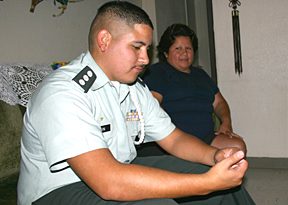Posted: 10/15/04
Christians from Iraq flee
rising Islamic fundamentalism
By Dale Gavlak
Religion News Service
AMMAN, Jordan (RNS)–Iraqi Christians flocked to the Latin Catholic church in the Hashmi district of the Jordanian capital, a drab working-class area, where they celebrated Mass in the ancient Chaldean language.
On a recent Sunday, some 200 worshippers packed the sanctuary, adorned with a simple wooden cross and a picture of the Virgin Mary and Christ. Here, away from their native country, these Iraqi Christians felt safe.
Fearing lawlessness and rising Islamic fundamentalism in their own country, large numbers of Iraqi Christians are fleeing to neighboring Jordan and Syria.
No one knows for certain how many of Iraq's 750,000 Christians have left the country since the removal of Saddam Hussein, but estimates are in the tens of thousands.
Most of Iraq's Christians are Chaldean Eastern rite Catholics who are autonomous from Rome but who recognize the pope's authority.
Other Christian groups include Roman and Syriac Catholics; Assyrians; Greek, Syriac and Armenian Orthodox; Presbyterians; Anglicans and evangelicals.
The level of mistreatment Christians face in Iraq is disputed, even among Christians themselves, but no one can deny the fear, which is palpable among those crossing the border. Church bombings in Baghdad and Mosul only fuel that fear, but so do individual stories, even though few can be substantiated outside of Iraq.
One Christian attending the Mass, Samir, requested that his full name not be used because of fear of reprisals against his family. A businessman from Baghdad, he recounted how militants linked to renegade Shiite Muslim cleric Moqtada al Sadr recently kidnapped and tortured him until his family paid ransom money.
“A gang came to my shop with machine guns and forced me into a car, where I remained for nine days,” Samir said. “They wanted $200,000 from me.
“They repeatedly hit me and poured boiling water all over my body. I was held hostage until my family paid them $50,000 to finally get me released.”
The man, in his mid-fifties, now walks with a cane, and burn marks are visible on his body. He says he and his family fled to Jordan but hope to find permanent refuge in Australia because he cannot find legal work here.
Samir and other recently arrived refugees said militants are targeting Christians in Iraq because they perceive the Christians have money. They also say Islamists have attacked predominately Christian-owned liquor, fashion and music shops, demanding their businesses be shut down because they are deemed offensive.
Another fresh arrival in Amman, Bernadette Hikmat, says all this is unwarranted because Iraqi Christians are peaceful and have had a low-key presence in Iraq for 2,000 years.
“Christians in Iraq do not instigate violent acts,” Hikmat said. “But unlike the Sunni and Shiite Muslim communities, we have no big tribes to support or protect us against harm, so that makes us vulnerable.”
The 29-year-old former government employee says she and her two younger brothers escaped with a few of their worldly possessions in a couple of suitcases.
“I believe we are also being targeted as Christians because we are viewed as suspected collaborators with U.S. and Western forces amid a rising tide of Islamic fundamentalism,” she said. “Of course, this is not true, but this perception only increases our problems.”
The synchronized bombings of five churches in recent weeks and another car bombing at a Baghdad church Sept. 10 have sent further shock waves into the Christian community.
The blasts killed 11 people and wounded more than 50 in Baghdad and in the northern city of Mosul.
They were the first significant strike on Iraq's Christians, who make up about 3 percent of the country's 25 million people.
A previously obscure group, the Committee of Planning and Follow-up in Iraq, claimed responsibility and warned more attacks would follow.
But Iraqi officials blame Al-Qaida ally and Jordanian-born terrorist Abu Musab al-Zarqawi for the assaults.
As a result of continued instability, many Christians are choosing to leave Iraq rather than return to their church pews.
Iraq's top Shiite Muslim cleric, Grand Ayatollah Ali Al Sistani, has condemned the attacks on the churches as “hideous crimes” but the country's migration minister says the exodus of Christians continues.
Pascale Isho Warda, herself a Chaldean Catholic Christian, estimates that 40,000 Christians have left Iraq because of a lack of security and organized attacks on their churches.
But the U.N. refugee agency disputes the figure. A spokesperson for the Iraq program of the U.N. High Commissioner for Refugees based in Amman said the estimate is unsubstantiated.
He said reliable numbers are hard to come by because many refugees have gone directly to foreign embassies, such as the Australian or Canadian embassies, to make their claim and have bypassed the United Nations in the belief that a claim of religious persecution will provide a chance for quicker asylum.
The refugee coordinator for the Middle East Council of Churches in Jordan, Wafa Goussous, said no Iraqi Christians have sought assistance directly from the organization.
Instead, Iraqi refugees go to their church communities upon arrival in Jordan for needed aid, such as housing and food.
The priest of the Latin Catholic church in Amman's Hashimi district, Raymond Musili, has put the figure of recent arrivals from Iraq at about 7,000 at his church alone.
In Syria, the U.N. refugee agency operating in Damascus reports about 4,000 Iraqi Christians have sought refuge in the country.
But even with the growing climate of fear in Iraq, there are stalwart Christians who choose not to leave their homeland. A small group of Pentecostal Christians visited Amman recently from Baghdad and reported their church is growing, despite pressures.
They also refuted claims of intimidation from Muslim militants.
What is irrefutable is the fear and anxiety among many Christians, who see their future as uncertain, at best, in the new Iraq.
News of religion, faith, missions, Bible study and Christian ministry among Texas Baptist churches, in the BGCT, the Southern Baptist Convention ( SBC ) and around the world.




